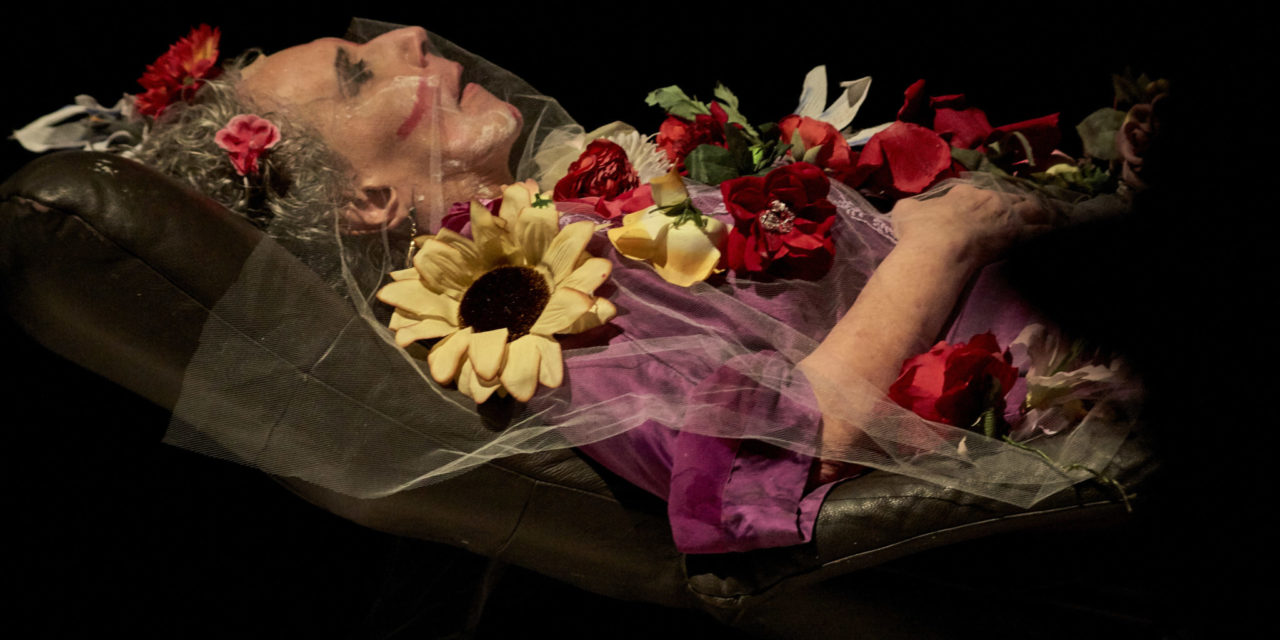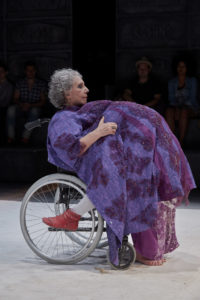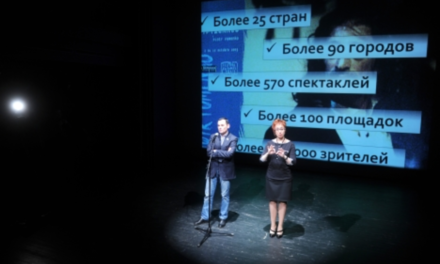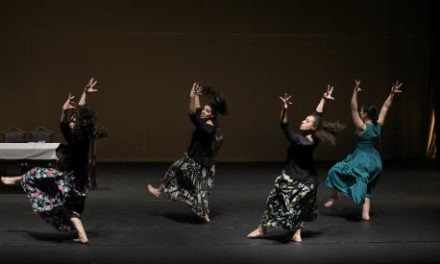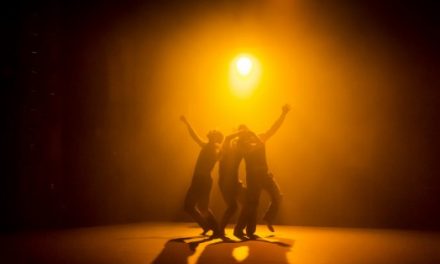When someone asked Maria Alice Vergueiro what would people talk about her after her death, she answered: “What would people talk about me? I don’t have a fixed judgment upon myself.” There is absolutely no way to have a fixed opinion about one the greatest Brazilian actresses. Totally devoted to theatre, Maria Alice Vergueiro has always been in that place where artistic trenches are opened.
Born in the city of São Paulo 1n 1935, she has been a performer since the 1960’s. Her debut was in The Mandrake, by Machiavelli, a play directed by Augusto Boal in the very politically engaged Teatro de Arena. In the following decade, she started working with another significative creative pole of Brazilian theatre, Teatro Oficina, acting in Gracias, Señor (Thank you, Lord, in Spanish) a collaborative creation, The Petty Bourgeois by Maxim Gorki and Bertold Brecht’s Galileo Galilei. By the end of the 1970’s, Maria Alice, Luiz Roberto Galízia and Cacá Rosset created their group, Teatro do Ornitorrinco (Theatre of the Platypus). With the company’s first play, The Stronger – inspired by Augusto Strindberg’s play – she won the Molière Award.
Boldness accompanied her and the Ornitorrinco throughout the 1980’s: Authors such as Bertold Brecht, Chico Buarque, Albert Innaurato and Samuel Beckett were staged by this actress’s enormous strength. In 1986, directed by Gerald Thomas, she performs Electra com Creta (which may be translated for Concrete Electra as well as Electra with Crete) and later, Molière’s The Imaginary Invalid.
In the 1990’s, she directs and performs in plays by Federico Garcia Lorca and Luis Rafael Sanches and, again, Molière. She gives an incredible performance in Am Ziel, a play by Thomas Bernhardt, and takes part in Faust, staged by Carmen Paternostro, celebrating Goethe’s 250 years. She also plays the role of Mother Courage in Brecht’s Mother Courage and Her Children, directed by Sergio Ferrara.
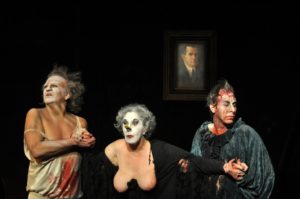
Luciano Chirolli, Maria Alice Vergueiro e Danilo Grangheia in The Three Old Ladies. Photo: Bob Souza.
After five decades of intense work in the theatre, one would expect she would slow down or at least that she wouldn’t keep on taking so many risks as an artist. But we really cannot have fixed judgments about her: Despite the Parkinson’s disease, and the necessity of a wheelchair, she joined a few younger artists and created Grupo Pândega. They staged Alejandro Jodorowsky’s The Three Old Ladies and they are now on tour with Why The Horse?, a play in which the actress carries on a compelling reflection on death.
The starting point of Why The Horse? is the pursuit of death – on stage. Fabiano Furtado’s dramaturgy delves into Brecht, Brazilian writer Hilda Hilst, Jodorowsky’s theatre plays, as well as Beckett and Fernando Arrabal. The scenography, a kind of arena, is an esthetical cemetery of Maria Alice’s 50 years in the theatre. In its gravestones, one can read the names of actors, scenographers, playwrights and directors who have been part of her artistic career. It makes the spectators acknowledge themselves as living gravestones, breathing in the work’s phantasmatic and grotesque universe. The images and collage-like scenes the cast present us while they drive her through the play in a wheelchair create a disturbing atmosphere. The performance is her voyage towards a way to overcome death, her diseases, and old-age limitations. And she accomplishes that by performing her own funeral at the end of the play when the spectators find themselves mourning her.
In this work, she blurs the frontiers between real and representation by exposing her body, which is stricken by hospital-acquired infections, cerebrovascular accident, and Parkinson’s disease. In this blur, she confesses the desire to find death on stage. The performance is a grand ritual of a negation of death as what lies underneath this requiem/happening is the desire for life, the desire and the right to live her life in her own way until it is time for her to die.
Even though her condition considerably disables her, she is on a national tour, putting up a major tour de force, pushing her life-long artistic boldness to face her fate.
Why The Horse?‘s national tour is part of Palco Giratório, an annual programme by SESC – Serviço Social do Comércio (Social Service of Commerce) which promotes the nation-wide transit of theatre groups from many different regions of Brazil. It is a paramount project to dramatic arts in the country. This year, for example, in its 19th edition, it has provided 728 performances in 145 cities. Besides the great international theatre festivals, this is one of the biggest actions concerning development and promotion of theatre and dance in Brazil.
It is due to Palco Giratório that this play is traveling throughout the country, taking Maria Alice Vergueiro to various venues in Brazil, spreading her attitude and the anthropophagy of our theatre, giving Brazilian audiences the opportunity to know better this amazing actress – and to say goodbye to her.
This post was written by the author in their personal capacity.The opinions expressed in this article are the author’s own and do not reflect the view of The Theatre Times, their staff or collaborators.
This post was written by Marco Vasques and Rubens da Cunha.
The views expressed here belong to the author and do not necessarily reflect our views and opinions.

